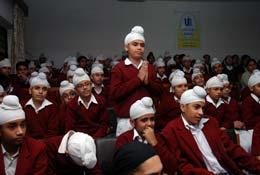Sikh population is dwindling

Migration, conversion and a lack of opportunities has led to a decline in the Sikh population in India, according to the latest religion-based census data released by New Delhi.
Sikh political and religious leaders are worried by data from Census 2011 showing a drop in the community’s population, with some even calling on families to have more children.
The Sikh share of the Indian national population, down from 1.9% in 2001 to 1.7% in 2011 according to the Census figures, has been described by leaders as a “cause for worry”, reported Indian media.
Aswini Nanda, demographic expert, says migration of Sikhs to countries such as the US, the UK and Canada was the main reason for fall in their population. He said a significant number of Sikhs had also moved to Italy and Australia — two new destinations for the community. Many of them are also settled in Norway and some other countries in Europe, he said.
Other reasons being cited by experts include prosperity. Sikhs were reportedly more prosperous and adopted family planning schemes earlier than others. A reason for switching to smaller families may be the shrinking land holdings, which they decided not to divide further.
In Punjab, the Sikh population has fallen to 57.7 per cent in 2011 as compared to 59.9 per cent in 2001, while that of Hindus has grown to 38.5 per cent from 36.9 per cent.
In Chandigarh, the Sikh population has come down to 13.1 per cent in 2011 from 16.1 per cent in 2001. Same is true for Delhi and Haryana. In Delhi, it fell from 4 to 3.4 per cent and from 5.5 to 4.9 per cent in Haryana. In J&K, the Sikh population stands at 1.9 per cent, in HP at 1.2 per cent, Uttarakhand at 2.3 per cent, and Rajasthan at 1.3 per cent. In almost all other states, it is varies from 0.1 per cent to 0.3 per cent.
Sikh leaders in North America blame conversions, drugs and migration for the decline in the growth rate of Sikh population in India.
"While Punjab leaders are promoting their family businesses, the youth has sunk in drugs. So what do you expect from drug addicts?" asked Toronto-based Sikh leader Nachhattar Singh Chohan.
Chohan, who heads the Indian Trucking Association in Canada, said: "Yes, migration from Punjab to the West is one reason. But the bigger factor is that people are abandoning Sikhism and joining various 'deras' in Punjab. The SGPC has failed the Sikhs."
Vancouver-based community activist Balwant Sanghera said: "First and foremost reason for declining Sikh population is the migration from Punjab to the West. Second, there is growing awareness to have smaller families."
Shrinking land holdings in Punjab are also forcing people to have fewer children to avoid further division of land among siblings.
"Finally, drugs are taking their toll on the Punjab youth. The drugs are reported to be causing impotence amongst boys, resulting in fewer births," Sanghera said.
Los Angeles-based Bhai Satpal Singh Kohli, the ambassador of Sikh Dharma in Western Hemisphere, said the Sikh population is declining because people are "not adhering to the Sikh code of conduct and leaving Sikhism to join various 'deras' due to poor leadership and discrimination against Dalits and poor Sikhs in Punjab."
He too said Sikhs were migrating for better opportunities. "Moreover, the trend is that Sikhs are increasingly marrying out of their religion. So the majority of their children now end up not being Sikhs," he added.
Kohli welcomes the directive of the Akal Takht jathedar to each Sikh family to have four children. "But more importantly, Sikhs need not select family planning for a male child and stop female foeticide."
Yuba city-based Jasbir Kang blames the destruction of the economy of rural Punjab for the migration of Sikhs to foreign lands.
"Events and after-affects of 1984 had serious impact on the Sikh psyche... Sikhs never committed suicides until the last two decades. People have lost their pride and self-respect," Kang said.
He added that Sikhs are converting to other religions as the clergy has failed to address the "issues of caste divisions, drug abuse and failure the issues of gender gap. If moms lose respect for faith, then children will not follow it either. We are at a crossroads".
Washington-based Sikh leader Rajwant Singh, who heads the Sikh Council on Religion and Education, said: "The turbulence of the 80s impacted average Sikh family dependent on agrarian economy. Political mishandling of economic and social issues, and militancy in the 80s and its suppression by security forces added to the woes of Punjab. These have had a direct impact on the average Sikh family."
Singh said the lack of opportunities have also pushed young Sikhs to try their luck elsewhere in the world, even if it means selling off valuable assets and facing migratory restrictions in many Western countries.









